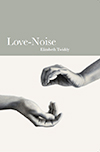Welcome to The Writer's Almanac Bookshelf, where you'll find highlighted interviews of poets heard on the show.
Elizabeth Twiddy

When did you first become interested in poetry? Do you remember your first poem?
I can't remember a time when I wasn't interested in poetry; my earliest memories center around sound, including the sounds of words, and the dovetailing of those sounds with visual images, so I really feel like an awareness of what we later come to call "poetry" begins as a primary thing, maybe even in the womb; it's one of those primal, first things, I would argue, for everyone, whether we realize it or not, and whether we call it "poetry" or not. Do I remember my first poem? Well if I'm going to be perfectly honest in answering that question, I'm going to risk the possibility of embarrassing myself because I think the earliest poem I wrote was in the form of a song dedicated to an extraordinarily unintelligent basset hound named Pokey whom my family owned for a very short time when I was about ten years old; the song was entitled (I answer hesitantly, but honestly) "Pokey Lies in the Garden," and it went along with a little tune I picked out on the guitar.

Love-Noise
(Buy Now)
(books by Elizabeth Twiddy)
Poem: "The End of Sleep" by Elizabeth Twiddy, from Love-Noise. © Standing Stone Books. Reprinted with permission.
Love-Noise is the title of your latest collection of poems, what does that compound word, love-noise, mean?
"Love-Noise" is taken from the last line of the poem, "What is a Woman," which is a part of the collection; the line is: "in the garden: terrifying love-noise." From the context of the poem, hopefully the reader understands that the "love-noise" in the final line refers to the noises the living make—and the living are coaxing the woman in the poem to come and join them in life; they are encouraging her to join them and to live fully into the present moment instead of living in the past and lamenting losses. To the woman in the poem, though, the noises are terrifying at the same time that they are about love—so there is this implication that love can be wonderful, of course, but that it can also be very scary. I took that phrase for the title of the collection because it feels so evocative of what all the poems are doing—they are all making their own sounds, and they ultimately are all speaking to and about love in some form or other. I like the idea that Love can have its very own sound.
Many of your poems have a very strong sense of place. What are some of your favorite places? Are there any that are especially conducive to poetry?
Wow. Well, I love Northern Michigan, where my dad lives now; I love Lake Michigan—the cold, clear water, big enough to behave like an ocean with its own tides, and the soft, white sand, and the most gorgeous rocks I've ever seen anywhere (I collect rocks there every summer when I visit and add them to my collection). Another place that's really large in my mind is the cabin in Vermont where I lived for a time by myself. That was an important time for me—I was recovering from debilitating vertigo, and then from a lung collapse, and trying to figure out what I wanted to do with my life while working all kinds of different jobs. It was there, in my cabin in Norwich, Vermont, that I woke up early every morning to get ready to go to work in a Biochemistry lab at Dartmouth Medical School and listened to The Writer's Almanac, dreaming of one day becoming a "real poet" and maybe even having a poem read on the show, then quickly dismissing the thought and forcing myself back to the task of getting ready to go to a job I didn't really want to go to. But really the place I've found that's most conducive to writing new poems—to having ideas for new poems and then beginning to put down the first images—is the car. There's something about being alone in a car, especially at night, being in control as you are when you're driving, controlling the temperature more exactly, as close as you can get to a lack of distraction, and also the constant motion and change of scenery—all of it adds up to this spaciousness in the mind where new ideas can really quickly generate and come together. When things start to click, I pull over to a safe place, take out my pen and paper, turn on the dome light—and jot things down.
Animals are also very prominent in your poems, are they a big part of your life?
My husband and I don't own any pets, and haven't (except for a couple of fish he acquired before he met me—which have been gone for years now), although we're seriously considering bringing a dog into our household soon. I grew up with dogs: a Weimaraner named Minka was my pal from the time I was born until the time she died when I was eight, and since I'm the oldest child in my family, she and I sort of bonded. Then we had the aforementioned Pokey (briefly), another Weimaraner, two dachshunds, and a parakeet. I love all kinds of animals and feel a very strong kinship with all of them. I wonder if everyone has had the experience of looking into the eyes of a non-human animal and sensing a powerful presence there—maybe a soul; I don't know, but there is this very real connection, and I realize in moments like those that we—all living things—truly are one big thing. There's something more honest and more accessible emotionally in other animals than there is in humans sometimes, and maybe I'm drawn to those animals because I'm looking for ways to show our own vulnerabilities more clearly. My dad is a biology (and an entomology) person, and my sister teaches AP Biology and AP Environmental Science, so maybe this affinity for animals runs in the family.
You teach poetry in Syracuse, New York. How has being a teacher affected your own writing?
Well—I have several speculations about that. One is that teaching poetry reminds me of some of the basics I might lose sight of, otherwise—so that I'm learning, too, while I'm teaching. Every time I write a poem, I'm learning how to write a poem; it's always different, every time, so there are new opportunities to learn my own lessons when I begin a new poem (or revise an old one), and whatever I've just been talking about in class is always fresh in my mind at those moments. Teaching also helps to remind me and clarify what I value in a poem: mystery and clarity at the same time; accuracy; musicality and sound—the meaning of pure sound when the words are taken away; and insight—some truth or psychological insight revealed. Related to that, when I'm working on my own writing, having taught a workshop recently, the compassion that I feel for my students—in remembering just how hard it is to write a poem—is closer to me and I find it easier to feel compassion for myself in my own struggles with writing, and finding that compassion for myself in my own process changes the process, itself. Maybe most importantly, for me, teaching keeps me social—and if I weren't forced to be social because of my teaching, I think I might be a real hermit. What's important about being social, where my writing is concerned, is that it fundamentally changes my psychology: being social makes me open up to ideas I might not access otherwise; there's a certain zany part of my personality that comes out when I'm with other people that doesn't when I'm alone. The performative aspect of my personality comes forward, and that stuff has something new and different to offer my poems—so it's great to get that balance into the poetry. When the psychology that comes from being alone mixes with the psychology that comes from being social, interesting things can happen in a poem.
What are you working on right now?
I'm writing the libretto for an opera about Matilda Joslyn Gage—and I'm constantly nervous about it because I really don't know what I'm doing. I'm always working on new poems; I don't really have a choice about that. I've just recently begun to think that I'd like to try my hand at a book of essays. I find that I'm funnier in life than I tend to be in my poems and that's getting to me, and although I can point to what I consider funny moments in my poems, I find it easier to let loose a little bit and be freer and funnier in essays. The other thing that I do a lot is draw, and I have some characters (specifically, a fox and a hedgehog) I'd like to develop in children's books, eventually. My always-on-the-side project is making new music with my husband, who's a composer and who makes his own instruments. I play the flute, guitar, a little bit of mandolin and a little bit of piano, and I sing.
Elizabeth Twiddy was born in Detroit and has lived in Syracuse, New York since 2001. Her first full-length collection of poems is Love-Noise (Standing Stone Books, 2010). She teaches poetry courses at the Syracuse YMCA's Downtown Writer's Center and serves as an editor for the poetry journal Comstock Review. For more, visit elizabethtwiddy.com.